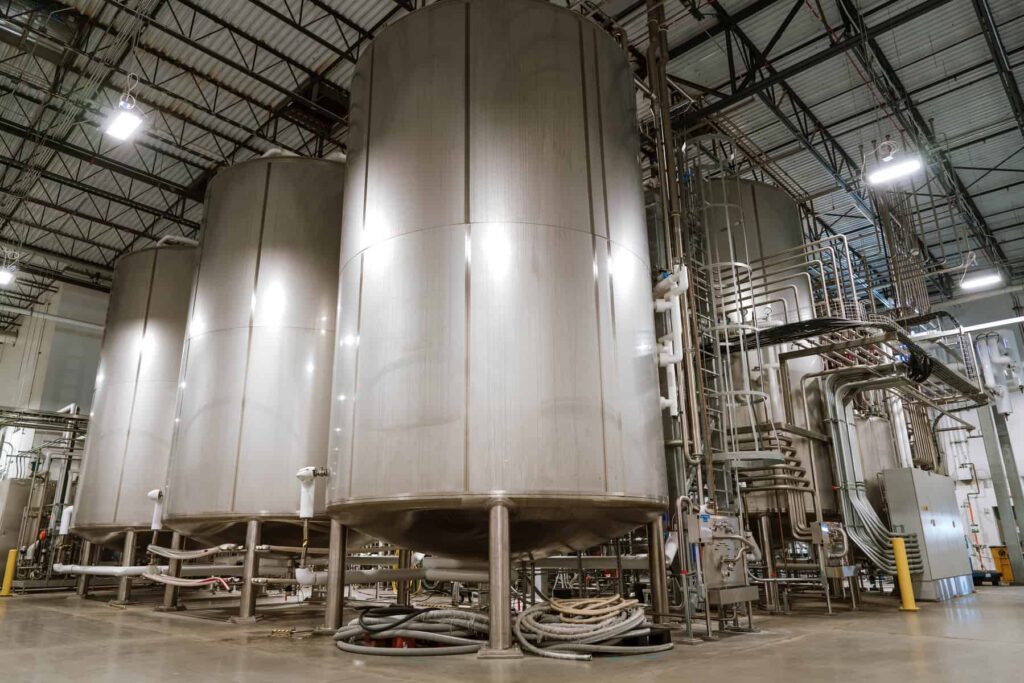A month into his new position as CEO of Colorado-based startup MycoTechnology, Dr. Mike Leonard caught up with AgFunderNews to talk about his new role.
Leonard, who spent four years at Boston-based foodtech company Motif Foodworks—three as CTO and one as CEO—insisted he was not jumping off a sinking ship (as he departed, Motif engaged in a further round of layoffs, first reported in AgFunderNews).
“That’s not how I see it. It was a very tough decision for me to leave after all the blood, sweat, and tears, and I have nothing but respect and admiration for the team at Motif. I’m very proud of what we accomplished, and I think we did a good job of creating options for the business to continue despite all the headwinds.
“But this opportunity came up at MycoTech and it was very compelling,” said Leonard, who has a degree in chemistry and PhD in polymer science & engineering, and held senior technical and commercial roles at IFF, Solae, PepsiCo, and Kraft Heinz before joining Motif in 2019.
“I’ve known [MycoTechnology cofounder] Alan [Hahn] for a while and MycoTech has always been a company I’ve kept my eye on as they placed bold bets on mycelial fermentation as far back as 2013. After 10 years as CEO, Alan was ready to step into an executive chair role and my name came up [as a potential CEO].”
‘An abundance of great options on the table’
Supported by $220+ million from backers including sovereign wealth fund the Oman Investment Authority and Nourish Ventures (Griffith Foods’ venture capital group), MycoTechnology has commercialized two platforms utilizing mycelium, the filament-like roots of mushrooms: ClearIQ bitter blockers and flavor modulators and FermentIQ fermented plant proteins.
A third platform—a 100% fungi-based whole food ingredient for meat alternatives—will be produced at a new plant in Oman set to open in late 2025 as part of a joint venture (Vital Foods Technologies) with Oman Investment Authority.
A fourth platform—an ultra-sweet protein found naturally in rare honey truffles that MycoTechnology is producing more cost effectively via precision fermentation—is in development; while a fifth platform—Fermentation as a Service (FaaS)—was announced in October.
“What’s exciting is that they have a great technology pipeline, very strong IP, and experience going to market at scale, so there is an abundance of great options on the table,” said Leonard, who moved to Denver, Colorado for the new job in early November.
“What I’m being asked to do is focus on the ones that are really going to be the highest drivers of value for the business going forward and focus on growing profitable revenue on a recurring basis.”
He added: “Alan and the team have built incredible products, and for the second and third generation of products, what’s going to be critical is not just product innovation, but process innovation. But we have a very talented team here that can help to drive that.”

FermentIQ fermented plant proteins still core part of portfolio, despite headwinds in alt protein segment
MycoTechnology’s flagship ingredient ClearIQ—which Leonard says is profitable—is the primary revenue driver at the company, with customers using the fungi-derived natural flavor in over 100 countries to tackle bitter, sour, or stringent off notes in everything from coffee, cacao, and plant proteins to natural sweeteners such as stevia and monk fruit, botanicals, and CBD.
FermentIQ (plant protein fermented with with shiitake mushroom mycelia) is also generating revenue, he claimed, although its highest-profile customer, alt meat co Planterra, was abruptly shuttered by parent company JBS last October.
“FermentIQ is a staple in our portfolio and part of our core, an amazing product that improves the flavor, texture and nutritional qualities of plant-based protein,” said Leonard. “We have a diverse customer base for the product, and we’re not dependent on one or two customers.
“But the landscape in plant-based protein, especially for meat replacement, has been very difficult over the past couple of years and our business is subject to those dynamics. So one of the things I’m keen on and Alan and our investors are keen on is finding all the opportunities to expand that product line in new applications or adjacencies in a profitable way.”
The plan in Oman
MycoTechnology’s joint venture with the Oman Investment Authority to build a biomass fermentation facility in Oman to make a fungi-based meat alternative is a “very exciting project to address critical food security issues in the Middle East,” claimed Leonard.
“Our objective is to leverage a rich carbon source that is right now just a waste product [dates left to rot or feed animals because they’re not the right color, shape, or size for the market] and use it to fuel biomass fermentation, to create a whole food ingredient with a great nutritional profile.
“Right now, we’re in the early stages of figuring out how to produce that at an industrial scale with the right economics, and I think everyone here would tell you that there’s still plenty of process technology work to be done.”
He added: “The plant [in Oman] has been spec-ed out. We know how to make the ingredient as we’ve made it here in the US, the challenge is producing it at scale. But I think it has a ton of potential. Using oyster mushroom mycelia rather than mold [Quorn and ENOUGH use a fungi/mold strain called Fusarium venenatum in their meat alternatives] also matters as our product has different sensory properties.
“From a consumer standpoint, the story around culinary mushrooms being the source of this food is also compelling, as there’s an ick factor around mold [editor’s note: Alt meat from Fusarium venenatum is considered GRAS by the FDA and listed as ‘mycoprotein’ on food labels].”

Sweet protein platform
MycoTechnology’s new sweet protein platform is particularly exciting, claimed Leonard, although he acknowledged that there are no silver bullets or simple ‘drop-in’ solutions in the world of high-intensity sweeteners.
“There’s a sweet protein found in [a rare white truffle called] the honey truffle that’s 1,500-2,500 times sweeter than sugar, which we have characterized and are able to produce via precision fermentation [engineering a microbe to produce a nature identical protein].
“We identified it two years ago and are now at a point where we are generating gram quantity samples. Sweet proteins are not new, but this particular one I don’t think has been explored on an industrial scale before. It has a very clean taste profile and no aftertaste, so it’s very compelling.”
Asked about the regulatory pathway for the protein, which is completely soluble and stable in alkaline and acidic pH conditions, he said: “We’re going to be pursuing the normal FDA GRAS [Generally Recognized as Safe] process, but we’ll be doing self-affirmed GRAS before that, a process that most likely is going to kick off next year.”
From a formulation perspective, he said, “The protein has very attractive properties on its own, but we’re also doing some blending work to understand exactly how companies would formulate with it.”
Exit strategy?
So what’s the exit strategy for investors at MycoTechnology, which now has around 100 employees in the US, Germany, The Netheralands, and Singapore?
According to Leonard: “It’s nice to think about [an IPO], but the job to be done here is to get the company to the point where we are self-sustaining, and we are growing profitable revenue on a recurring basis. And MycoTechnology is on the cusp of that.
“ClearIQ and FermentIQ, we’ve been selling those for a few years now, and revenues are growing, so we’re not in a situation like a lot of foodtech startups where profitability is multiple years away. ClearIQ is a specialty flavor modulating ingredient used at far lower inclusion rates than FermentIQ, so obviously, the profit profiles are different, but they’re both driving revenue.”
Further reading:





